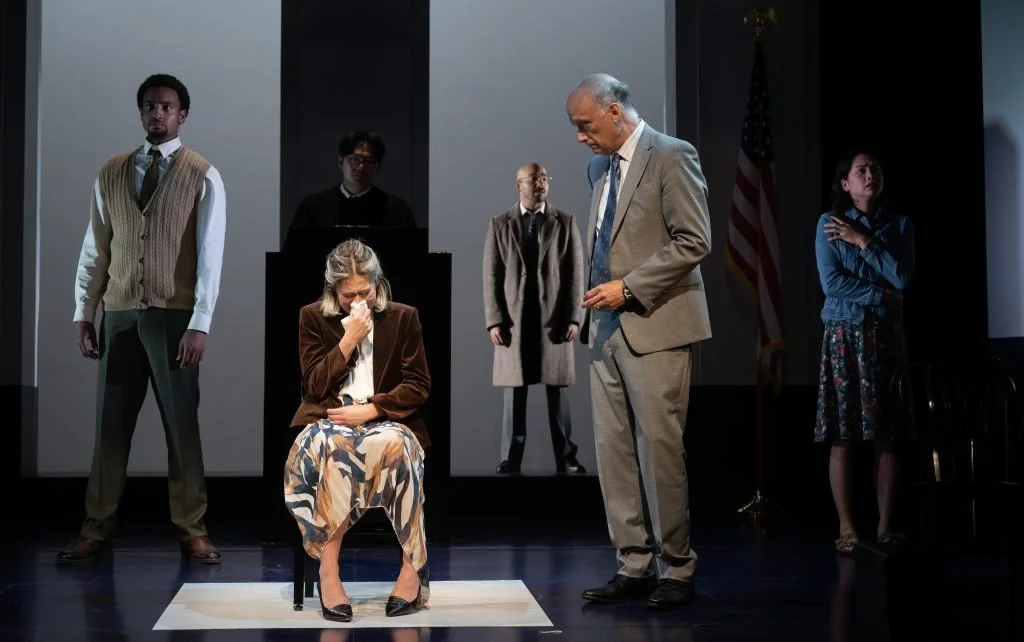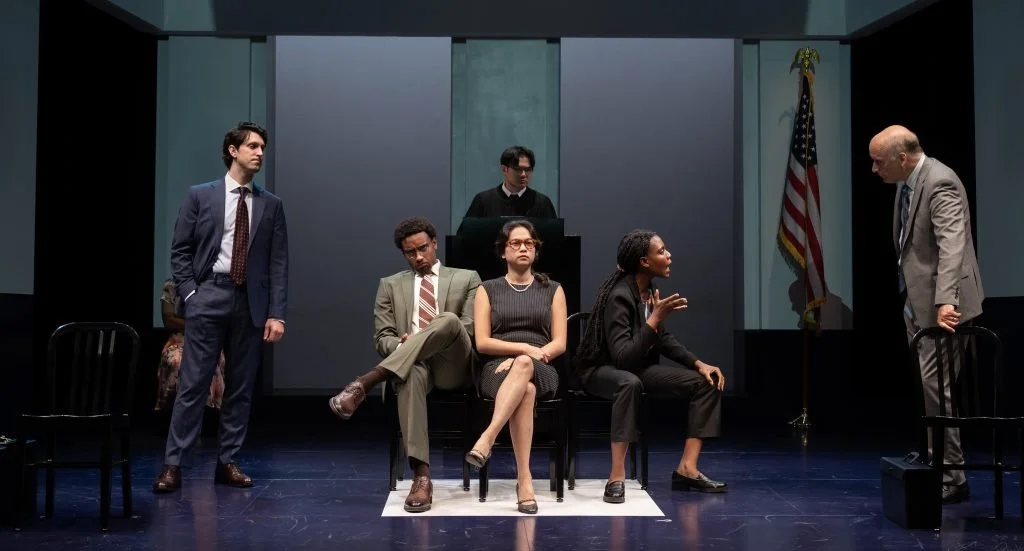“Execution of Justice” Exposes the ‘Twinkie’ Defense—at Chautauqua
Photos by Dave Munch
Emily Mann Revives Outrage Over 1978 Moscone/Milk Murders
by Jenyth Jo
When San Francisco Supervisor Dan White revealed—in a taped confession—that he deliberately shot both Mayor Moscone and Supervisor Harvey Milk in City Hall, the public expected a first-degree murder conviction. White, a former Marine, fireman, and cop, fired two bullets into the head of Moscone. He reloaded his gun, walked into Milk’s office, and shot him in the head at point-blank range.
White held deep-seated grudges against liberal Mayor Moscone and against Milk, who was the first openly gay elected official in California. Double murder was his answer.
But on May 21, 1979, a San Francisco jury delivered a “voluntary manslaughter” verdict. Riots erupted.
Emily Mann’s 1985 docu-drama about that trial remains relevant today. Mann is directing the Chautauqua Theater Company’s new production, successfully incorporating testimony from “uncalled witnesses.” These witnesses form a chorus of commentary on court testimony and theories of intent, completing her picture of the trial.
Clever use of live cameras provides enlarged images on an angled big screen. Mann pioneered video onstage in the 80s, and today the projections mimic reality TV. Historic photos memorialize Milk’s and Moscone’s triumphs. Displays of their wounds and blood remind us that in the U.S., angry young white men still take up guns, attempt assassinations, and commit murders.
Effective lighting design by Jeanette Oi-Suk Yew adds emotional impact, especially during the candlelight vigil scene. Images of the actual 30,000 marchers on Market Street testify to the solemnity.
Tony-award winner Frank Wood accurately plays Thomas F. Norton, the understated prosecutor. This assistant D.A. has an impeccable record, but his clear logic and facts fail against the defense’s theatrics.
Defense lawyer Douglas Schmidt expertly appeals to the emotions of the mothers on the jury. He does not argue against what White did, but why he did it. His emotional debate conquers rational arguments.
In a still surreal moment of the trial, Dan White’s paid expert witnesses claim that his consumption of sugary drinks and white carbs created a confused psychological state. The so-called “Twinkie” defense blurred the reality of shooting a .38 caliber pistol. Did White know he was going to kill on that fateful morning, or did the Twinkies make him do it?
As Schmidt, passionate yet nuanced David Bertoldi cajoles and pleads—as if he were begging for his own life, instead of Dan White’s. Surely this married father deserves mercy?
Or does he? Dan White, superbly played by Zach Appelman, was imprisoned for just 5 years after he killed the two public officials. His jail time was shorter than the seven-year shelf life of your average Twinkie.
After this verdict, the California legislature ended the “diminished capacity” defense. I was a teenager when the verdict was read, and I never understood how White received a lesser sentence than Patty Hearst’s 1976 bank robbery sentence of 35 years. The phrase “Twinkie Defense” became synonymous with getting away with murder.
In these times of judicial misconduct and slippery stories, the play reminds us of the importance of documenting, instead of whitewashing, history. Echoes of “I never knew that” and “what compelling acting” filled the theater after the performance. Mann’s play shows the necessity of fair and unbiased courts, especially when it comes to jury selection, and politically appointed judges.
“Execution of Justice” –written & directed by Emily Mann, scenic design by Brittany Vasta, costumes by Jen Caprio & Michelle Ridley, lighting by Jeanette Oi-Suk Yew, sound by Mark Bennett, projections by John Narun, at Chautauqua Theater Company, Chautauqua, New York.
Info: chq.org – to July 25, 2025.
Cast: Zach Appelman, Matt Saldivar, Frank Wood, Julien Alam, Anina Baker, David Bertoldi, Ayla Decaire, Germainne Lebrón, Bailey Lee, Olamide Oladeji, Christopher Thomas Pow, and Amarih SoVann.




